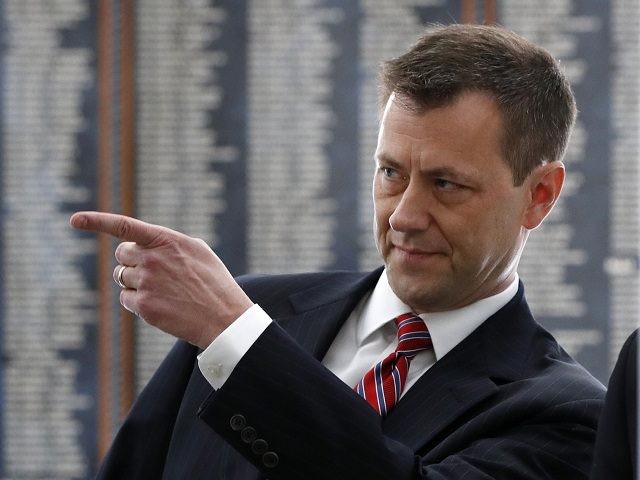An FBI agent who worked on the investigation of Michael Flynn and Special Counsel Robert Mueller’s investigation into “Russia collusion” told investigators that prosecutors had a “get TRUMP” attitude that distorted their inquiry into the facts.
The Department of Justice released the record Thursday of a recent FBI interview with Special Agent William Barnett as part of its motion to drop the charges against Flynn. Judge Emmet Sullivan has resisted efforts by the DOJ to drop the charges. Flynn originally pleaded guilty to lying to the FBI, but withdrew that plea as exculpatory evidence emerged. A review of the case by U.S. Attorney Jeffrey Jensen uncovered more exculpatory evidence, but Sullivan refused to allow the case to drop.
Sullivan also invited an amicus curiae brief from retired judge John Gleeson, who told the court he believed Flynn’s guilt was “obvious” and that the DOJ was likely motivated by improper political interference from President Donald Trump.
In new filings arguing for the charges to be dropped, the DOJ has produced additional exculpatory evidence, including text messages showing that FBI agents were sufficiently uncomfortable with the Flynn case to consider buying liability insurance.
The record of the interview with Barnett — the “302” — includes even more explosive information exonerating Flynn.
Barnett told investigators that he believed the evidence for the theory that the Trump campaign was colluding with Russia had always been thin. One piece of evidence alleged, for example, was based on news reports that the Republican Party had changed its platform to be less supportive of Ukraine (a claim that has been debunked). Barnett thought that was “groping.”
Over time, Barnett became convinced there was no link between Flynn and the Russians. He called the case “supposition on supposition,” and he described the investigation as disorganized.
He later requested permission to do an interview with Flynn, which he believed would serve to close the case — and he was denied. Later, Peter Strzok said that the case was to be closed — then said it would remain open. Barnett said that he was told to look for a violation of the Logan Act, a law barring private citizens from conducting diplomacy. (Notes taken by Strzok, included in an earlier document release, suggest then-Vice President Joe Biden had brought up the possibility of a Logan Act violation in an Oval Office meeting.)
Barnett did not think there was a Logan Act violation. He was shocked to learn, on January 25, 2017, that FBI agents had been to the White House to interview Flynn (they had been sent by then-director James Comey). He told investigators that, after his own request to interview Flynn had been denied, he believed he had been deliberately “cut out” of the interview.
After that, he said, the investigation of Flynn became “top down,” driven by senior officials. It accelerated after a Washington Post columnist published a column suggesting that Flynn had been captured on wiretaps talking to the Russian ambassador.
Barnett asked to be removed from the Flynn investigation, which he believed was then being directed by Deputy Director Andrew McCabe. He did not expect it to lead to Flynn’s prosecution, he said. He was then recruited to join the Special Counsel’s investigation. He briefed a member of the team, Jeanne Rhee, a lawyer who had once represented the Clinton Investigation. He found that she resisted the idea that there was no evidence Flynn had committed any crime.
Later, Barnett said, he believed that the Mueller investigation had a “get TRUMP” bias. The inquiry, he said, was driven by the prosecutors rather than the investigators. The prosecutors, he said, seemed convinced that they would find evidence of a crime and would ignore explanations given by witnesses that did not match their theories. In one instance, he said, they interpreted a public statement by Trump about the need to “get to the bottom” of the matter as being an effort to “cover it up.”
There “always seemed” to be someone “who claimed to have a lead on information that would prove the collusion only to have the information be a dead end.” It came to the point, he said, where he and others began telling a joke called “Collusion Clue”: ‘In the hypothetical game, investigators are able to choose any character conducting any activity, in any location, and pair this individual with another character and interpret it as evidence of collusion.”
Flynn’s next court date is Monday.
Joel B. Pollak is Senior Editor-at-Large at Breitbart News and the host of Breitbart News Sunday on Sirius XM Patriot on Sunday evenings from 7 p.m. to 10 p.m. ET (4 p.m. to 7 p.m. PT). His new book, RED NOVEMBER, tells the story of the 2020 Democratic presidential primary from a conservative perspective. He is a winner of the 2018 Robert Novak Journalism Alumni Fellowship. Follow him on Twitter at @joelpollak.

COMMENTS
Please let us know if you're having issues with commenting.